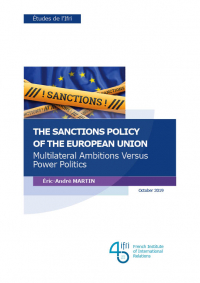Gateway to Think Tanks
| 来源类型 | Publications - Reports |
| 规范类型 | 报告 |
| DOI | 979-10-373-0099-7 |
| The Sanctions Policy of the European Union: Multilateral Ambitions Versus Power Politics Etudes de l'Ifri, October 2019 | |
| Éric-André MARTIN | |
| 发表日期 | 2019-10-03 |
| 出版年 | 2019 |
| 概述 | Restrictive measures are a major instrument of the European Union (EU)’s external action, which has emerged as one of the world’s leading sanctions emitters. The EU has thus leveraged the size of its market and its economic and financial clout (trade relations, aid policy and bilateral... |
| 摘要 |
The Sanctions Policy of the European Union: Multilateral Ambitions Versus Power Politics Etudes de l'Ifri, October 2019
Restrictive measures are a major instrument of the European Union (EU)’s external action, which has emerged as one of the world’s leading sanctions emitters. The EU has thus leveraged the size of its market and its economic and financial clout (trade relations, aid policy and bilateral agreements).  Through its significant activity in the field of sanctions, the EU has been able to reinforce its image as a normative power and a global player, contributing actively to international peace and stability. The EU’s restrictive measures were adopted in a favorable international context, marked by the legitimacy that was conferred, most of the time, by United Nations resolutions, and by close coordination with the United States (US). This privileged period culminated with the management of the Iranian crisis and the conclusion of the 2015 Vienna Agreement. More recently, however, sanctions have tended to lose their function as an instrument contributing to shape a shared vision of the world order, and to become what they are in essence, namely an instrument of statecraft dedicated to the protection of States’ national interests. This trend is illustrated on the one hand by the affirmation of a unilateral United States policy on sanctions, which tends to extend the scope of coercion to third parties, including European entities, and on the other hand, by the increasing use of sanctions by powers like China and Russia as a geo-economic tool. This new situation regarding sanctions places an emphasis on economic security and sovereignty and confronts the EU to its vulnerability within an international order that was conceived and dominated by the United States. But it also raises the EU’s incapacity to develop power politics, especially as regards economic statecraft. The forms of coercion to which the EU is and will be confronted should lead it to develop defensive tools at least, and consequently to adjust its trade policy as well as its rules regulating economic competition on its internal market. As for European companies, which are exposed to risks of prosecution by the US justice system, they have already developed compliance procedures in order to reduce their vulnerabilities.
The Sanctions Policy of the European Union: Multilateral Ambitions Versus Power Politics
|
| 关键词 | Multilateralism Sanctions China European Union |
| URL | https://www.ifri.org/en/publications/etudes-de-lifri/sanctions-policy-european-union-multilateral-ambitions-versus-power |
| 来源智库 | French Institute of International Relations (France) |
| 引用统计 | |
| 资源类型 | 智库出版物 |
| 条目标识符 | http://119.78.100.153/handle/2XGU8XDN/416554 |
| 推荐引用方式 GB/T 7714 | Éric-André MARTIN. The Sanctions Policy of the European Union: Multilateral Ambitions Versus Power Politics Etudes de l'Ifri, October 2019. 2019. |
| 条目包含的文件 | ||||||
| 文件名称/大小 | 资源类型 | 版本类型 | 开放类型 | 使用许可 | ||
| couv_eamartin_sancti(33KB) | 智库出版物 | 限制开放 | CC BY-NC-SA |  浏览 | ||
| martin_sanctions_pol(1260KB) | 智库出版物 | 限制开放 | CC BY-NC-SA | 浏览 | ||
除非特别说明,本系统中所有内容都受版权保护,并保留所有权利。